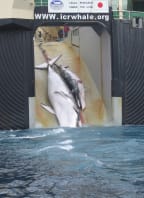After years of diplomatic wrangling and violent clashes in Antarctic waters, the United Nations' top court is due to deliver a binding judgment on Japanese whaling in the Southern Ocean.
International Court of Justice (ICJ) is scheduled to will deliver a binding judgment in the case between Australia and Japan on Monday.

A whale and calf are hauled aboard a Japanese ship in Antarctic waters. Photo: AAP / Australian Customs Service
Canberra has asked a 16-judge panel to ban Tokyo's annual hunt on the basis it is not "for purposes of scientific research" as allowed under Article 8 of the 1946 whaling convention.
Australia argues Japan is cloaking a commercial whaling operation "in the lab coat of science" so it can continue to sell whale meat just as it did prior to agreeing to the 1986 ban.
However, during a three-week hearing in the Netherlands in mid-2013, Tokyo countered that the ICJ didn't have the authority to decide what was, or wasn't, science. Japan insisted lethal research was both lawful and necessary.
New Zealand backs Australia's case and formally lodged an intervention before the ICJ, meaning it is bound by the court's decision but does not bear the same responsibilities or costs.
The judgment will come seven years after then Australian opposition leader Kevin Rudd first pledged a future Labor government would take legal action against Tokyo, AAP reports.
Mr Rudd was duly elected prime minister in November 2007 but it took another 18 months before the government instituted proceedings in mid-2010.
Clashes between Japan's whaling fleet and Sea Shepherd activists have become a dramatic staple of the southern hemisphere summer in recent years.
Norway and Iceland conduct commercial whaling operations but, unlike Japan, have not agreed to the commercial whaling ban.
Greenpeace spokesman John Frizell said a decision in favour of Australia "would place Japan in a very difficult position and present great difficulties for its operation in the Antarctic". But if the judges rule for Japan "they will feel vindicated and free to continue their operations which are becoming increasingly controversial".

